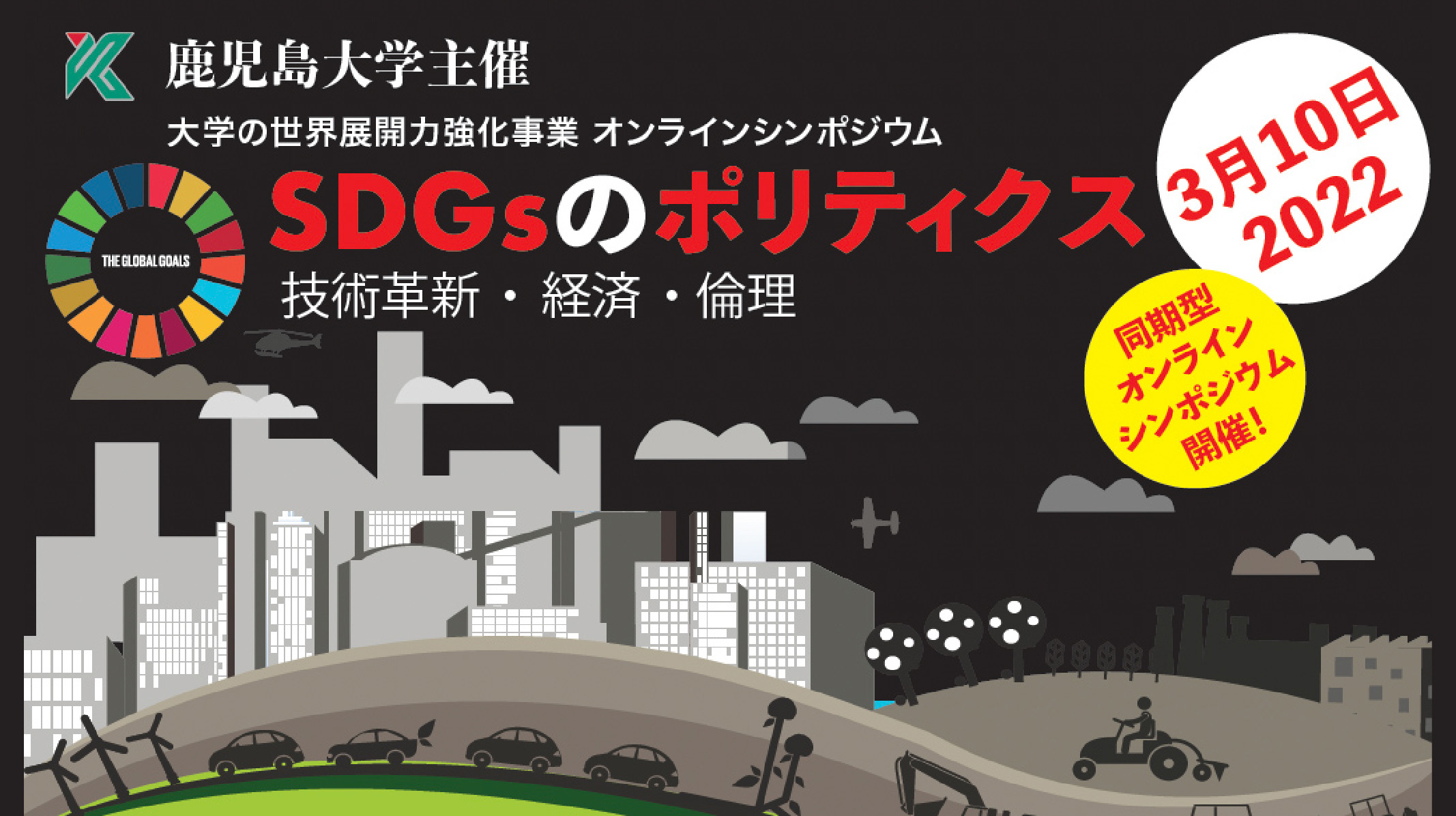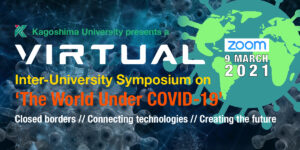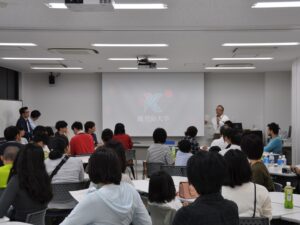Introduction
In the midst of the continuing situation of the COVID-19 pandemic, the online symposium of the US-Kagoshima-Asia Triad program in the Inter-University Exchange Project was organized by Kagoshima University as an opportunity to share a topic and to exchange opinions among the 18 partner universities from U.S. and Asian countries. We received a total of 243 applications and had 302 accesses to the symposium.
This year’s symposium was designed with the following four objectives to make it fruitful to attendees and to provide a forum for discussion within the partner universities of the project.
1: Topic of the symposium
The Politics of Sustainable Development Goals (SDGs) was chosen as a discussion topic because it was an issue to be challenged through global collaboration over the last four years. Another reason was that it involved inter-disciplinary research and discussion in several fields ranging from the economy to environment, and society.
2: Target participants: From students to citizens
To discuss a topic that affects the future of society, participation of not only professionals but also students, young scholars, and the general public is necessary. As part of the symposium, a documentary film screening was planned as a pre-symposium event, especially for young people to know about the topic and to be able to participate in free discussion on the topic. Unfortunately, the film screening was cancelled because of the sudden increase in the number of the COVID-19 infection in the beginning of 2022 in Japan.
3: Two-tier symposium system
In making the symposium accessible for people across countries to participate beyond time and space, it was held in a two-tier system: a synchronous one-day symposium was concurrently held with an asynchronous symposium component available on demand for a month.
4: Faculty Development
The symposium was also an opportunity for the members of different faculties to learn from each other on how to conduct COIL (Collaborative Online International Learning) classes to enhance global learning.
Program
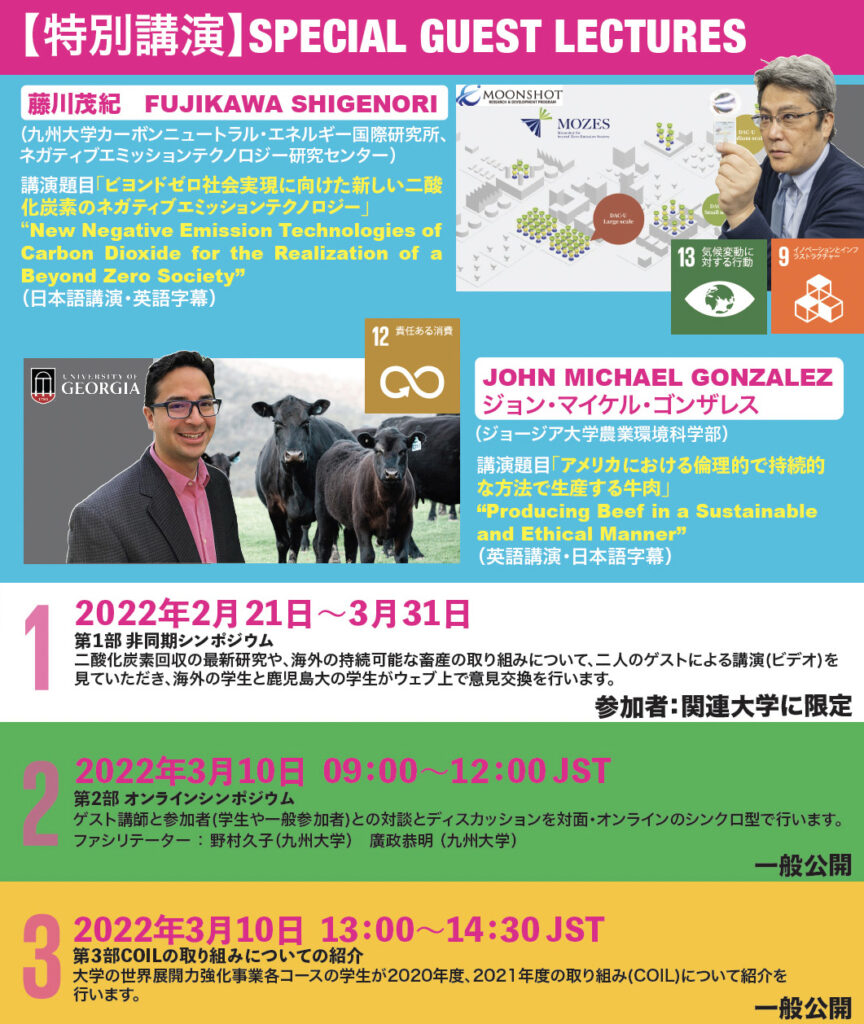
Part One: Asynchronous Online Symposium
February 21 – March 31, 2022
Part 1 was an asynchronous online session which was exclusively for the students and faculty members of Kagoshima University and its partner universities. A total of 108 participants registered for Part 1.
Participants from various countries were able to view the two video presentations and have the opportunity to make comments or ask questions to the two guest speakers via the web forum. These questions were presented to the guest speakers during the panel discussion in Part 2, the synchronous online symposium held on March 10, 2022.
The number of views we had for Part 1 video lectures are as follows:
- Producing Beef in a Sustainable & Ethical Manner (Dr. John Michael Gonzalez) : 88 views
- New Negative Emission Technologies of Carbon Dioxide for the Realization of a Beyond Zero Society (Dr. Shigenori Fujikawa) : 53 views

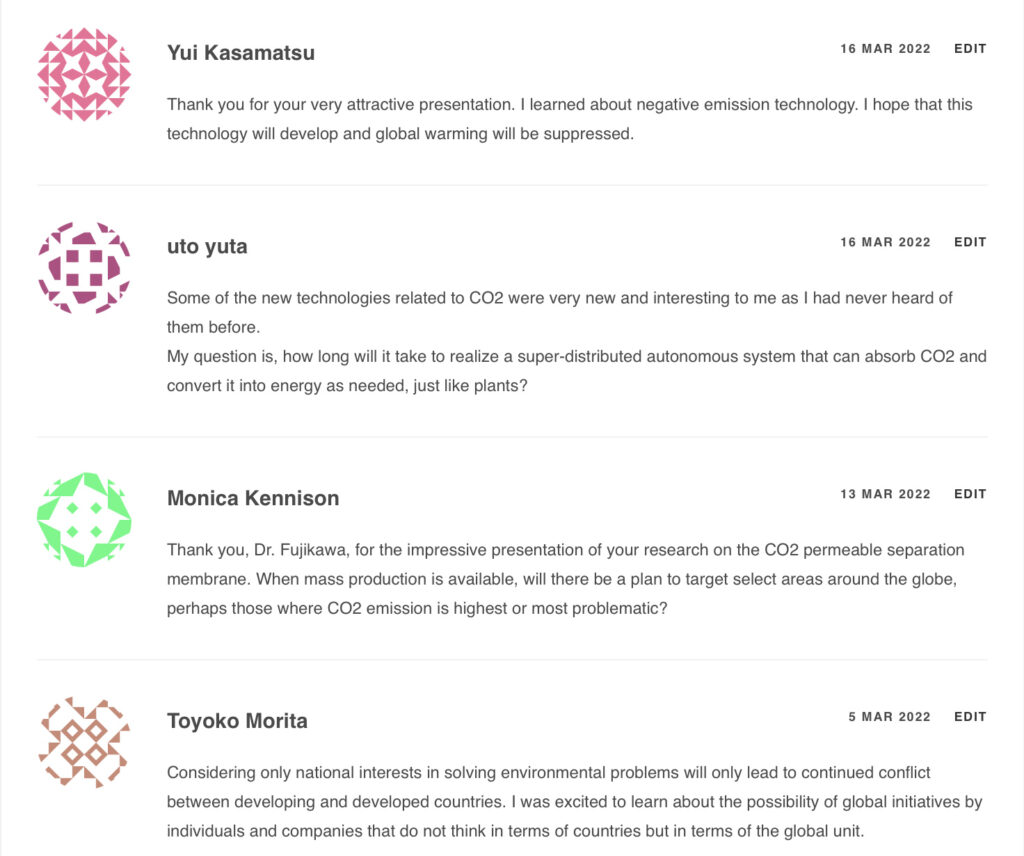
Part Two: Synchronous Online Symposium
March 10, 2022 (9:00 – 12:00 JST)
108 participants from across the world joined the online synchronous session via Zoom.

Symposium Directors: Takafumi Gotoh (Faculty of Agriculture, Kagoshima University), Yoshiro Kaneko (Fuculty of Engineering, Kagoshima University)
Chair: Miki Namba (Global Initiative Center, Kagoshima University)
Opening Remarks: Akira Sano (President of Kagoshima University)
Symposium Introduction: Sumie Nakatani (Global Initiative Center, Kagoshima University)
Keynote Lecturers: John Michael Gonzalez (Department of Animal and Dairy Science, University of Georgia), Shigenori Fujikawa (Research Center for Negative Emissions Technologies (K-NETs) Kyushu University)
Discussion Facilitators: Hisako Nomura (Fuculty of Agriculture, Kyushu University), Yasuaki Hiromasa (Faculty of Agriculture, Kyushu University)
Guest Speakers: Sanchai Jaturasitha (Department of Animal Science and Aquaculture, Chiang Mai University), Phattawin Setthaya (Science and Technology Research Institute, Chiang Mai University
Closing Remarks: Masanori Baba (The Vice President for Research and International Affairs, Kagoshima University)
First Keynote Lecture
The first keynote lecturer, Dr. Gonzalez from the University of Georgia’s Department of Animal and Dairy Science delivered his lecture on “Producing Beef in a Sustainable and Ethical Manner.” (The pre-recorded version of this lecture is accessible here: https://youtu.be/Bs_EaHhPu0w)
After the lecture, Professor Gotoh invited two of his students (Ms. Ayaka Takafuji & Mr. Taketo Haginouchi) to give a presentation on the Japanese example which illustrated the differences in approaches taken in the US and Japan and other Asian countries. Following the presentation by the students, a lively exchange of opinions was held with the audience during the Q&A session.
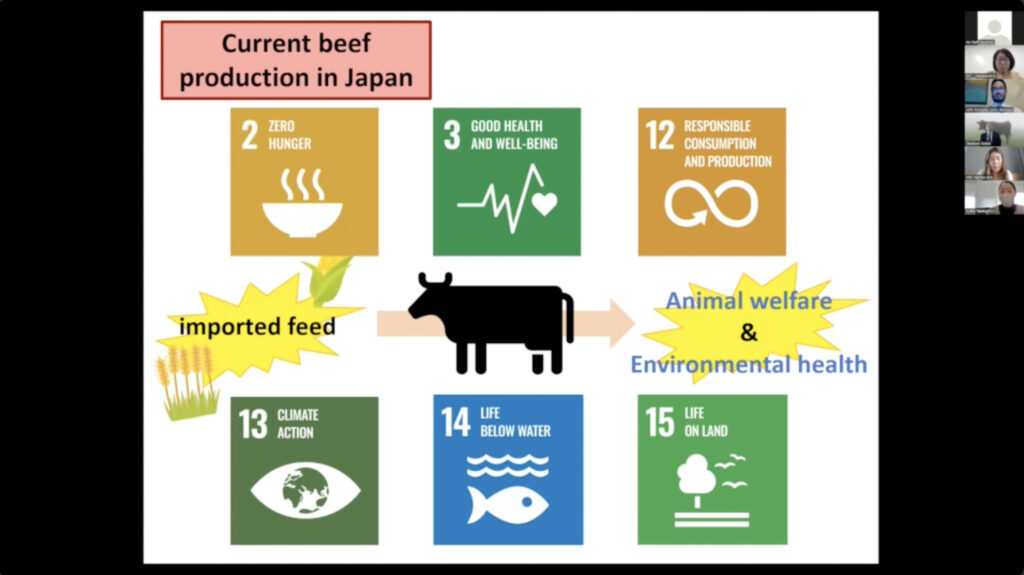
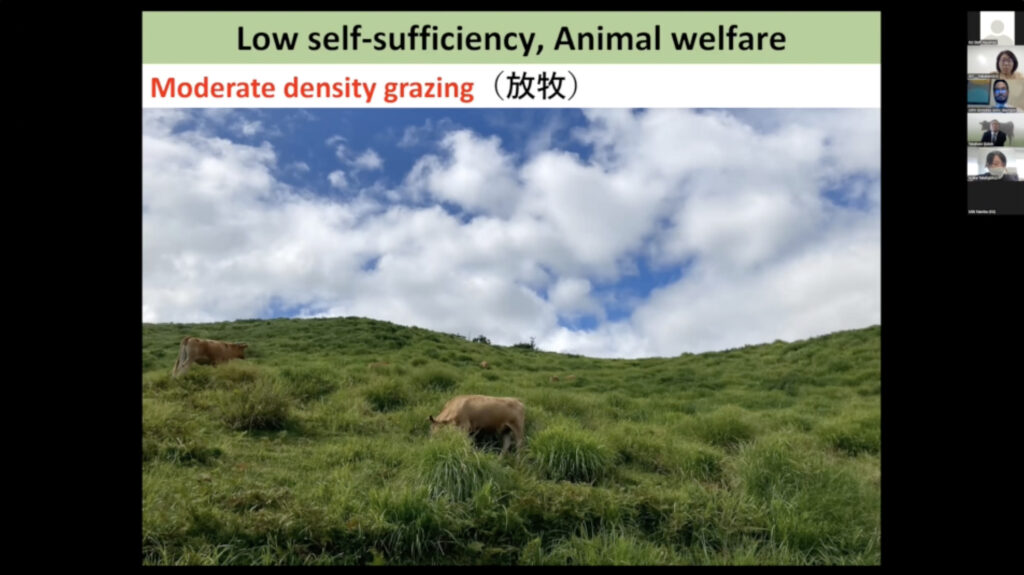
Second Keynote Lecture
The pre-recorded video lecture by Dr. Fujikawa from the International Institute for Carbon-Neutral Energy Research, Kyushu University, entitled ‘New Negative Emission Technologies of Carbon Dioxide for the Realization of Beyond Zero Society’ was played. (The video lecture is accessible here: https://youtu.be/6BU8lWSM9aw). He introduced the latest negative CO2 emission technologies such as Direct Air Capture or DAC technologies which are currently undergoing research around the world as well as the carbon recycling technologies which are developed to utilize captured carbon for our daily lives.
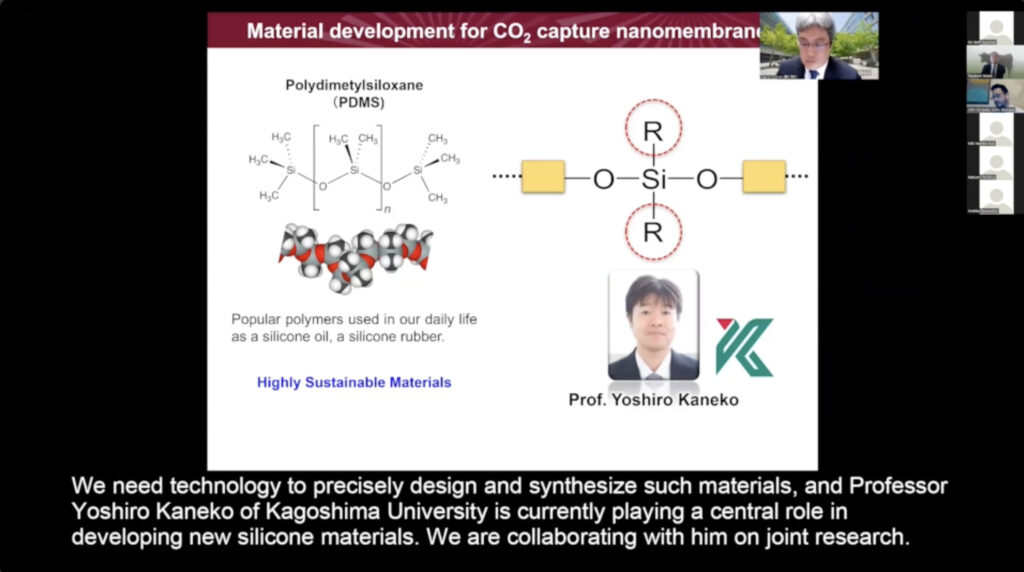
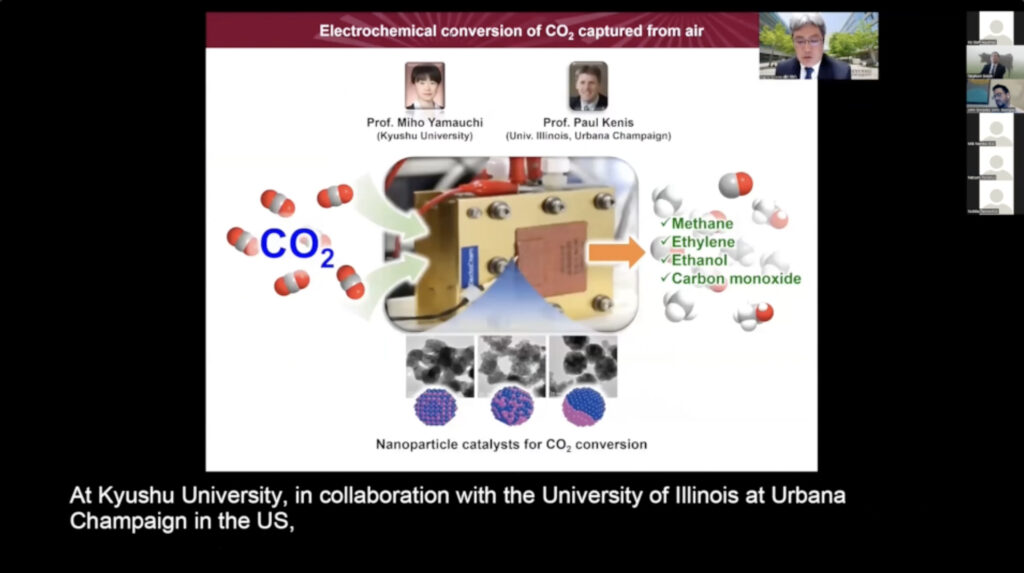
Following the lecture, five students introduced by Professor Kaneko from the Department of Engineering, Kagoshima University asked Dr. Fujikawa several questions about, for example, international competition for development of the emissions reduction technologies and its affects to society. Fujikawa answered first in Japanese, followed by English.
Guest Talks
Before the open discussion session began, Dr. Phattawin Setthaya from Chiang Mai University raised some topics that may guide the following discussion Dr. Phattawin gave a presentation entitled “Beef Production in Thailand to Support Sustainable Development Goals (SDGs)” and discussed the cultural aspect of the consumption of beef in Thailand and introduced the government support on the research for the sustainable beef production.
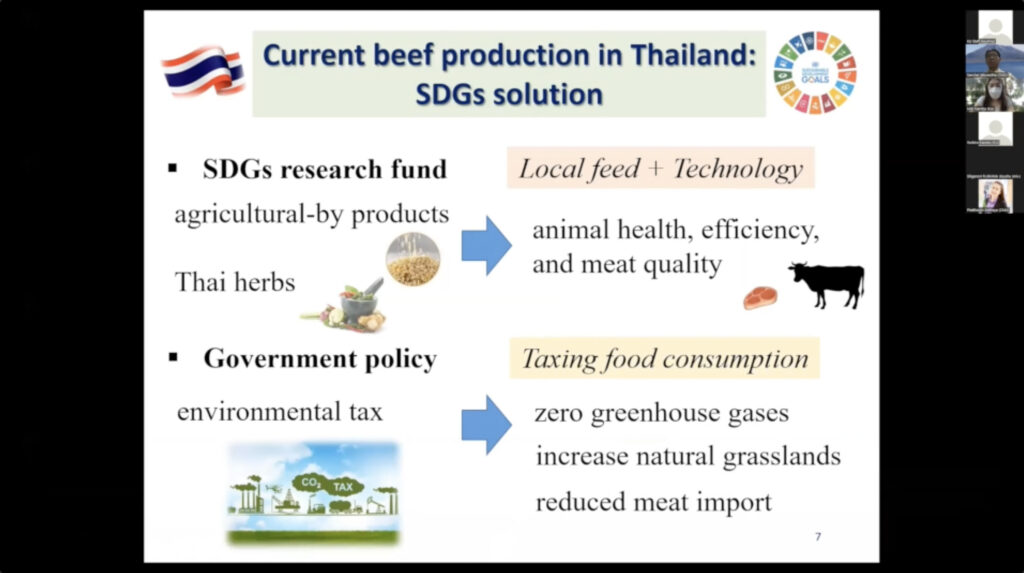
Open Discussion
Finally, the general discussion time facilitated by Dr. Yasuaki Hiromasa and Dr. Hisako Nomura, both from Kyusyu University, was held where the participants discussed the key points for the sustainable development and the difficulties encountered in the fields of innovative technology development and sustainable food production. As Dr. Hiromasa and Dr. Nomura raised crucial topics to be addressed, students thought about the issues and shared their ideas, and two keynote lecturers answered questions. Overall, the symposium encouraged an active discussion among both students and teachers from across the world. Both English and Japanese were used throughout the session.
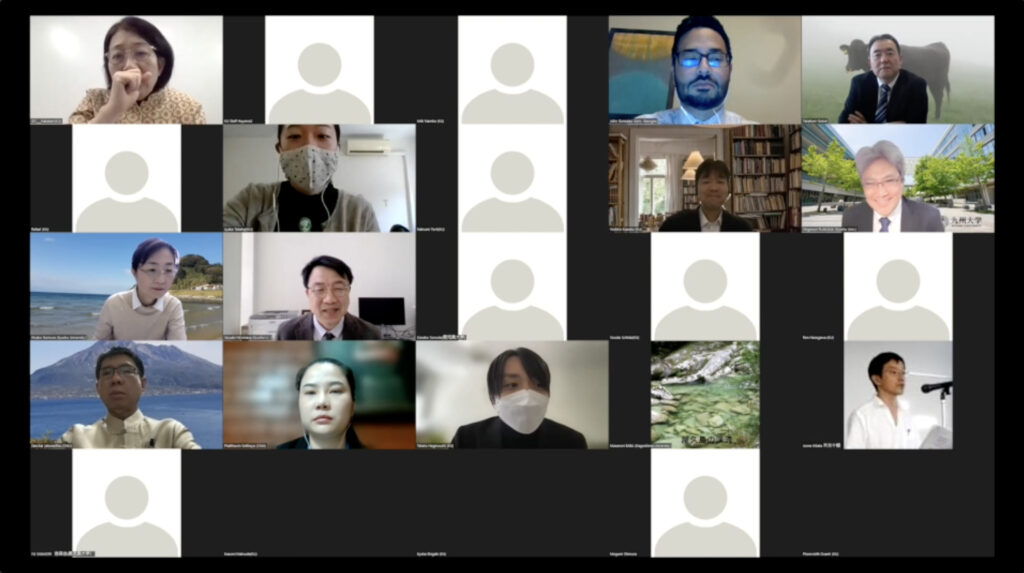
At the end of the discussion, Dr. Sanchai Jaturasitha gave a short presentation on the Chiang Mai University’s attempts to meet the SDGs, especially in the field of bioeconomy.
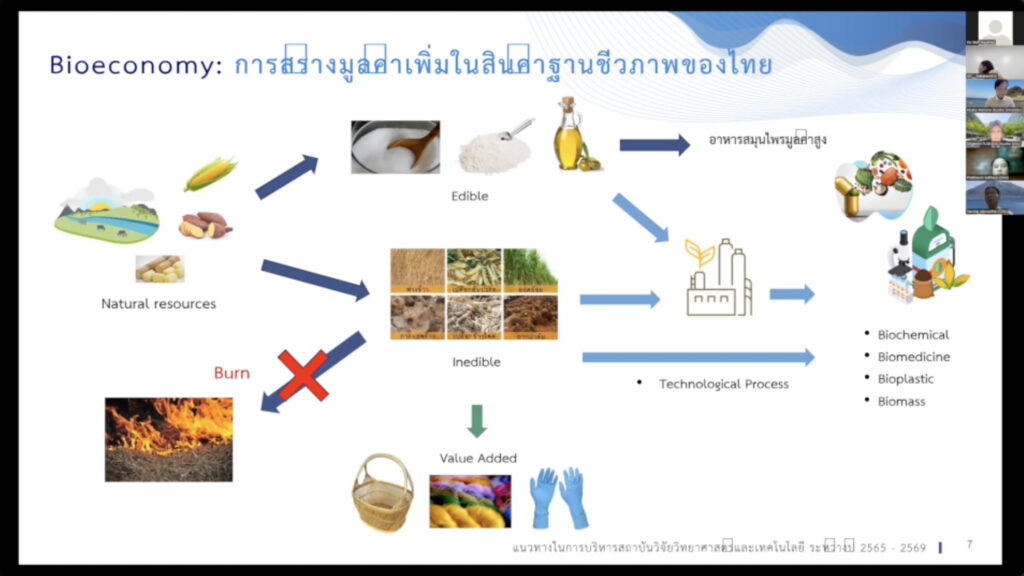
Dr. Gonzalez and Dr. Fujikawa followed by making final remarks and commented on some important points in realizing the SDGs. Dr. Nomura closed the open discussion by reminding that the individual choices and decisions are key to achieving a sustainable society.
As a closing remarks for the Part 2 session, Dr. Baba, the Vice President for Research and International Affairs for Kagoshima University gave a short speech in both English and Japanese.
Symposium Feedback
All attendees were asked to complete a post-event survey. We have received 42 survey results in total as of 31 March, 2022, in which most comments were positive and showed satisfaction with their experience.
Part 3: Initiatives for the “From the United States to Kagoshima and Asia: Trilateral Collaboration Program in the Multipolar Era”
March 10, 2022 (13:00 – 14:30 JST)
The part 3 of the symposium was held, where teachers and students who participate in the US-Kagoshima-Asia Triad Inter-University Exchange Program shared their experiences and exchanged information. In this session, students and teachers of each course focused especially on COIL (collaborative online international learning) conducted during the COVID-19 pandemic and presented their method and outcomes. The list of presentations is as follows.
Rika Yatsushiro (Faculty of Medicine)
COIL with the US and South Korea in 2021: Health Assessment Education through a Virtual Home Visit on a Remote Island
Miki Namba (Global Initiative Center)
Asynchronous COIL class between Burapha University and Kagoshima University
Making of Learning Material for COIL between Wisconsin University and Kagoshima University
Sumie Nakatani (Global Initiative Center)
2021 COIL with San José State University: Marketing Strategies of Costco and A-Z
Toyoko Morita (Global Initiative Center)
COIL with National Cheng Kung University “Comparative Study on the Influence from Government Policy between Taiwan and Japan”
Naoki Miura (Faculty of Veterinary Science)
International Learning Exchange between Kagoshima University, The University of Georgia, National Chun Hsing University and Efforts for SDGs
Junne Kikata (Faculty of Engineering)
Triad COIL Program in Environment Architecture with Tuskegee University and Universe of Diponegoro: Vernacular Architecture and the Future
Yoshiro Kaneko (Faculty of Engineering)
Inter-universities Online Classes of Nanoscience and Biotechnology Course with North Dakota State University and National Cheng Kung University
Munechika Ishizaki (Faculty of Fisheries)
Postgraduate (Master) Program on Tropical Fisheries with International Linkage (ILP) with University of Philippines, Visayas
De-Xing Hou (Faculty of Agriculture)
COIL with Hunan Agricultural University on “Phytochemicals and Healthy Functions”
Daisuke Hamanaka (Faculty of Agriculture)
Online Collaborative Learning on HACCP (Hazard Analysis and Critical Control Point) with Oklahoma State University and Mae Fah Luang University
Takafumi Gotoh (Faculty of Agriculture)
COIL of Beef Production Course with Texas A&M University, Chiang May University and University of Georgia
Keiko Unedaya (Global Initiative Center)
Cultural Aspects and Issues on Sustainable Development Goals in Hawai’i and Beyond: Kagoshima – Konan Short-Term Program at the University of Hawai’i at Manoa
